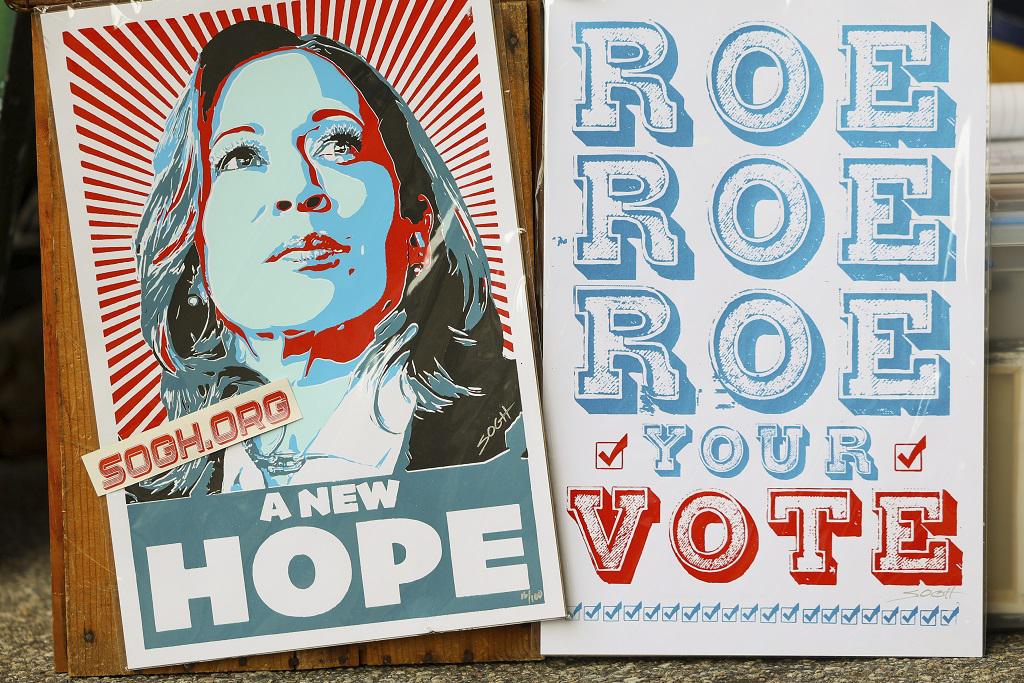
The Democrats’ celebration of the swap-out of the old guard for the next generation is almost complete, and the speechifying almost over. With horse race–obsessed journalists convulsed by the slightest shifts to shades of blue in the polling universe, Vice President Kamala Harris has tempered expectations and embraced her status as the underdog—or, at best, an underdog with momentum—on the rocky road to the White House.
The hysteria over President Joe Biden’s competency that chased him from the race was quickly stifled by eruptions of joy, excitement, and hope that greeted Harris’s unexpected elevation. “The contagious power of hope,” as former first lady Michelle Obama declared Tuesday night, “is making a comeback.”
Hope is a time-honored watchword of Reconstruction, the three major eras of social, economic, and political upheaval that have defined the African American experience. Black gains have always been followed by deep retrenchment. The First Reconstruction delivered a blink of liberation before Jim Crow yanked African Americans back to peonage and terrorism. Decades of bloody mid-century skirmishes in the South birthed the civil rights movement and the Second Reconstruction, the greatest leap forward for one of the most maligned peoples on the planet.
The Third Reconstruction dawned on a freezing January day 15 years ago when Barack Obama strode up to the summit of political power on the West Front of the U.S. Capitol. Seven years after that, a new set of political power brokers arrived on the scene, committed to the continuing mission to stamp out the legacies and achievements of people of color, yet another period of retrenchment.
Can Kamala Harris win the presidency and resuscitate the Third Reconstruction, hobbled by the twin forces of GOP reactionism and a global pandemic?
An August New York Times profile illuminated the hurdles that Harris has faced in the West Wing. No doubt, like former President Obama, she relied on hypervigilance in her role: “Deliberate and disciplined, cautious and at times risk averse,” the Times reported, “she saw trapdoors around her and wanted to avoid them. She considered herself a team player, but could not always be sure the team had her best interests at heart.”
Ron Klain, Biden’s former chief of staff who left last year, divulged more than he realized when he told the Times that, although the West Wing honchos wanted Harris to succeed, “We just didn’t find the path to do it.” It’s an admission that speaks volumes about the casual misogynoir that Black women endure, from the White House to the warehouse, which undervalues their competencies.
Like Shirley Chisholm, Jesse Jackson, and Barack Obama, Harris has deployed hope to prick the American conscience for its failures to deliver on the nation’s promises.
Tasked with an assignment that would sap the strengths of a seasoned regional expert, Harris dutifully took up the issue of immigration and the southern border. (Though she had some experience in California with border issues, it was entirely in the context of law enforcement and transnational gangs.) She made the best of it, as many women do when given a “no-win” assignment that they can’t refuse. Her achievements on job creation in Guatemala, Honduras, and El Salvador were mixed at best. “Not a huge amount, but it ain’t chicken feed and that links to jobs,” a former Clinton administration official has concluded.
Only in the aftermath of the Supreme Court’s disastrous Dobbs abortion decision did the West Wing settle on a portfolio matched to Harris’s strengths.
Rep. Shirley Chisholm, the first Black woman to serve in Congress, sought the Democratic presidential nomination in 1972, the first African American to do so. She wrote in her book The Good Fight, “I ran for the Presidency, despite hopeless odds, to demonstrate sheer will and refusal to accept the status quo … The next time a woman runs, or a black, a Jew or anyone from a group that the country is ‘not ready’ to elect to its highest office, I believe he or she will be taken seriously from the start.”
Most Democratic voters have embraced Harris with a deep affection that hasn’t been seen since Obama made his campaign swings in 2008. The vice president is the darling of the double-haters who didn’t want to vote for Biden or for former President Trump. Her selection of Gov. Tim Walz of Minnesota as her vice-presidential partner is very early, and so far reassuring, evidence of her political judgment.
One month into her candidacy, the pummeling that Harris, the biracial daughter of immigrants, faces from Trump and his surrogates indicates that she is being taken very seriously. The insults about her intelligence, physical appearance, lineage, and loyalties will continue to fly, as misinformation and disinformation surges, and a phalanx of lawyers gear up for the rough months ahead. Michelle Obama may have underlined the exhilaration of “being on the cusp of a brighter day,” but she also has experienced “the dimming of … hope” and “a palpable sense of dread about the future.”
Like Shirley Chisholm, Jesse Jackson, and Barack Obama, Harris has deployed hope to prick the American conscience for its failures to deliver on the promises etched on the faded parchments sealed in glass cases in the nation’s capital. Jackson, the ailing preacher and social justice activist who was honored for his legacy at the Chicago convention earlier this week, deployed hope at the Democratic convention in 1988, after his vibrant yet unsuccessful bid for the Democratic presidential nomination.
“Use hope and imagination as weapons of survival and progress, but you keep on dreaming, young America. Dream of peace. Peace is rational and reasonable. War is irrational in this age, and unwinnable,” Jackson said. Near the end of his speech, he intoned, “You must not surrender. You may or may not get there but just know that you’re qualified. And you hold on, and hold out. We must never surrender. America will get better and better. Keep hope alive!” He leaned into that refrain to deafening applause—it was embraced by Black America and became a time-honored signpost of the late-20th-century condition.
Eight years into the 21st century, candidate Barack Obama relied on “hope and change” as the antidote to an economic meltdown sparked by a subprime mortgage crisis that ushered in the Great Recession, which snatched away a generation of African Americans’ hard-won wealth. As Obama insisted on exercising the powers that were his to wield, the deep and insidious resentment over his historic victory fueled the backstabbing machinations of then-Senate Majority Leader Mitch McConnell and stoked one of fiercest racial backlashes in American history, setting in motion the surreal matchup between Harris and Trump. The results of the fall election could propel or snuff out the Third Reconstruction.
The next months are full of perils. In opening the Pandora’s box and unleashing the evils that once had been damped down, if not stamped out, in America, the Republican Party has fiddled with forces that are outrunning their ability to corral them. Kamala Harris is as prepared as she can be, and she no doubt knows that after every vile evil escaped Pandora’s box, at the bottom was a thing called hope.


